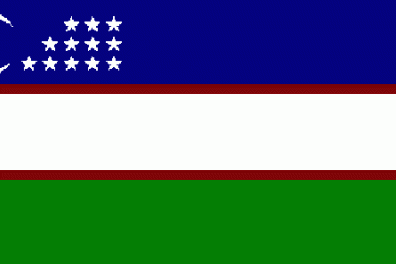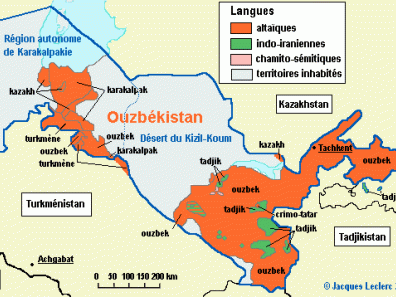The Uzbek language

Uzbek is spoken in Uzbekistan, eastern Turkmenistan, Tajikistan, northwestern China and northern Afghanistan: some 4 million Uzbek speakers live in these areas, and the language has official status. Large groups also live in neighboring countries, the historic territory of the Turkic peoples of Central Asia: one million in Tajikistan, over 900,000 in Kyrgyzstan, 600,000 in Kazakhstan, and around 300,000 in Turkmenistan.

Uzbek belongs to the çagatay branch of the Turkic languages. The lexicon contains many words borrowed from Arabic, Persian and Russian due to Islamization and long-standing historical relationships. The dialects of Uzbek are numerous and include features of Qarluq, Qipchaq and Oghuz, all dialects of the same language.
Until 1927, Uzbek was written in the Arabic alphabet, then in the Latin alphabet between 1927 and 1940, before the Cyrillic alphabet took over for fifty years. In 1989, when Uzbek became the official language, the authorities decided, at the suggestion of local intellectuals, to substitute the Cyrillic alphabet for Latin, but the reform (carried out between 1993 and 1995) was interrupted and the two alphabets now coexist. In everyday life and education, the population over the age of thirty reads and writes in the Latin alphabet. As for the younger generation, they have rapidly adapted to both alphabets: the rise of English language teaching and the dominance of Russian in public life also explain the phenomenon.
In 2020, Uzbek President Shavkat Mirziyoev issued a decree designed to speed up the complete transition to Uzbek in Latin alphabet: the decree sets out the broad lines of language policy for the years 2020-30. Despite the fact that the Russian-speaking population has declined (by a million people) over the last 30 years, the Russian language remains an instrument of "inter-ethnic" communication. And the hybridity of modern culture has split the Uzbek population in two: one developed class and one lagging behind, with the choice of language indicating the social level. The Uzbek language has found itself marginalized and in an almost neo-colonial situation, with those who don't speak Russian finding themselves culturally sidelined. However, Uzbek is still used in cinema, theater and music: but if we analyze the language of the films, we notice that the dialogues are mostly in Tashkent dialect. This has led to a reduction in vocabulary, the use of more slang and neologisms, in short, to a domination of urban codes.

In 2016, a new state university of Uzbek language and literature was founded in Tashkent, the Alisher Navoi University, where Uzbek studies are promoted: in 2018, a Turkological center was opened and the new president announced plans to translate a hundred works of classical Russian literature to contribute to the development of the national language. A second policy concerns the translation of Uzbek classics into English.
The internet and social networks also contribute to linguistic developments: the Uzbek news agencies kun.uz, daryo.uz, Turon24 and major foreign radio/TV stations such as "Voice of America" and "Sputnik" are stimulating a competitive market on Facebook and Instagram: the only problem is the lack of linguistic unity, which can lead to misunderstandings and comprehension difficulties among listeners, and gives the impression that Uzbek media is above all transnational, strongly influenced by English.
Be that as it may, a program to "rescue" the Uzbek language requires not only major investment but also specialists from all fields - philologists, historians, jurists, orientalists and specialists in the hard sciences and mathematics - in order to bring about the emergence of an Uzbek language of science. And, of course, we need to encourage the development of literature through support for publications in Uzbek.
Muyassar KHAYDAROVA
Lecturer in Uzbek at Inalco
http://www.inalco.fr/langue/ouzbek
